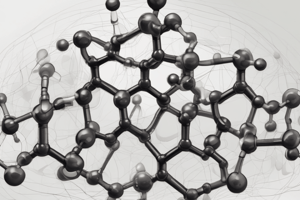Podcast
Questions and Answers
What is organic chemistry primarily the study of?
What is organic chemistry primarily the study of?
- Inorganic compounds
- Water molecules
- Carbon compounds (correct)
- Gas mixtures
Covalent compounds are mostly solid at room temperature.
Covalent compounds are mostly solid at room temperature.
False (B)
What are hydrocarbons?
What are hydrocarbons?
Compounds with only carbon and hydrogen.
Which of the following is an example of a medication mentioned?
Which of the following is an example of a medication mentioned?
What does the octet rule state?
What does the octet rule state?
Carbon has _____ valence electrons that participate in chemical bonds.
Carbon has _____ valence electrons that participate in chemical bonds.
Match the type of bond with its description:
Match the type of bond with its description:
Which substances are considered addictive according to the content?
Which substances are considered addictive according to the content?
Why are saturated carbon chains more compact?
Why are saturated carbon chains more compact?
Flashcards are hidden until you start studying
Study Notes
Organic Chemistry Overview
- Organic chemistry focuses on carbon compounds, primarily consisting of carbon and hydrogen.
- Example compounds include ethyl alcohol, oil, antiseptics, and petroleum gas.
Carbon Bonding and Stability
- Carbon forms covalent bonds by sharing its four valence electrons with other atoms.
- Bonds lead to a stable outer electron shell filled with eight electrons (octet rule).
- Covalent compounds typically exist as liquids or gases at room temperature due to their low melting and boiling points.
Hydrocarbons
- Hydrocarbons are compounds made solely of carbon and hydrogen, classified as hydrophobic (water-repelling).
- Common hydrocarbons are flammable under heat and oxygen exposure.
Importance of Organic Compounds
- Essential for biological processes and compose all food items.
- Organic compounds encompass a wide range of molecules critical to life.
Polar and Non-Polar Covalent Bonds
- Polar covalent bonds exhibit unequal electron sharing.
- Non-polar covalent bonds involve equal sharing, primarily seen between carbon atoms.
Ethylene in Fruits
- Ethylene is produced by fruits, leading to ripening by triggering cellular degradation.
Medications
- Organic compounds play a role in pharmaceuticals, including aspirin, Tylenol, decongestants, sedatives, and insulin.
Addictive Substances and Hormones
- Substances like caffeine, nicotine, alcohol, and narcotics are notable examples of organic compounds.
- Hormones such as adrenaline, dopamine, and serotonin are made from organic compounds.
Saturated Compounds
- Saturated compounds contain carbon chains with maximum hydrogen atoms and only single C-H bonds.
- Alkanes are the simplest saturated hydrocarbons.
- Saturated chains can become solid when tightly compacted, impacting their physical properties.
Studying That Suits You
Use AI to generate personalized quizzes and flashcards to suit your learning preferences.




